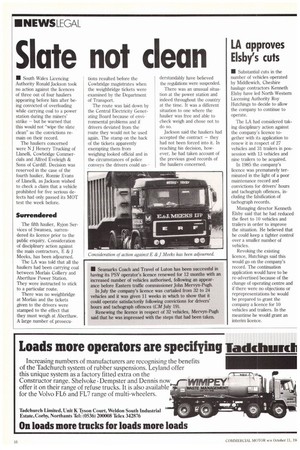Slate not clean
Page 18

If you've noticed an error in this article please click here to report it so we can fix it.
• South Wales Licencing Authority Ronald Jackson took no action against the licences of three out of four hauliers appearing before him after being convicted of overloading while carrying coal to a power station during the miners' strike — but he warned that this would not "wipe the slate clean" as the convictions remain on their record.
The hauliers concerned were N J Henery Trucking of Llanelli, Cowbridge Commercials and Alfred Eveleigh & Sons of Cardiff. Decision was reserved in the case of the fourth haulier, Ronnie Evans of Llanelli, as Jackson wished to check a claim that a vehicle prohibited for five serious defects had only passed its MOT test the week before.
Sunendered
The fifth haulier, Ryjon Services of Swansea, surrendered its licence prior to the public enquiry. Consideration of disciplinary action against the main contractors, E & J Meeks, has been adjourned.
The LA was told that all the hauliers had been carrying coal between Morlais Colliery and Aberthaw Power Station. They were instructed to stick to a particular route.
There was no weighbridge at Morlais and the tickets given to the drivers were stamped to the effect that they must weigh at Aberthaw. A large number of prosecu
lions resulted before the Cowbridge magistrates when the weighbridge tickets were examined by the Department of Transport.
The route was laid down by the Central Electricity Generating Board because of environmental problems and if drivers deviated from the route they would not be used again. The stamp on the back of the tickets apparently exempting them from weighing looked official and in the circumstances of police conveys the drivers could un-. derstandably have believed the regulations were suspended.
There was an unusual situation at the power station and indeed throughout the country at the time. It was a different situation to one where the haulier was free and able to check weigh and chose not to do so.
Jackson said the hauliers had accepted the contract — they had not been forced into it In reaching his decision, however, he had taken account of the previous good records of the hauliers concerned.
























































































































